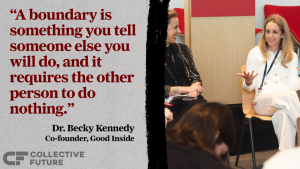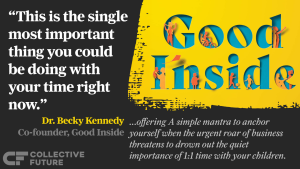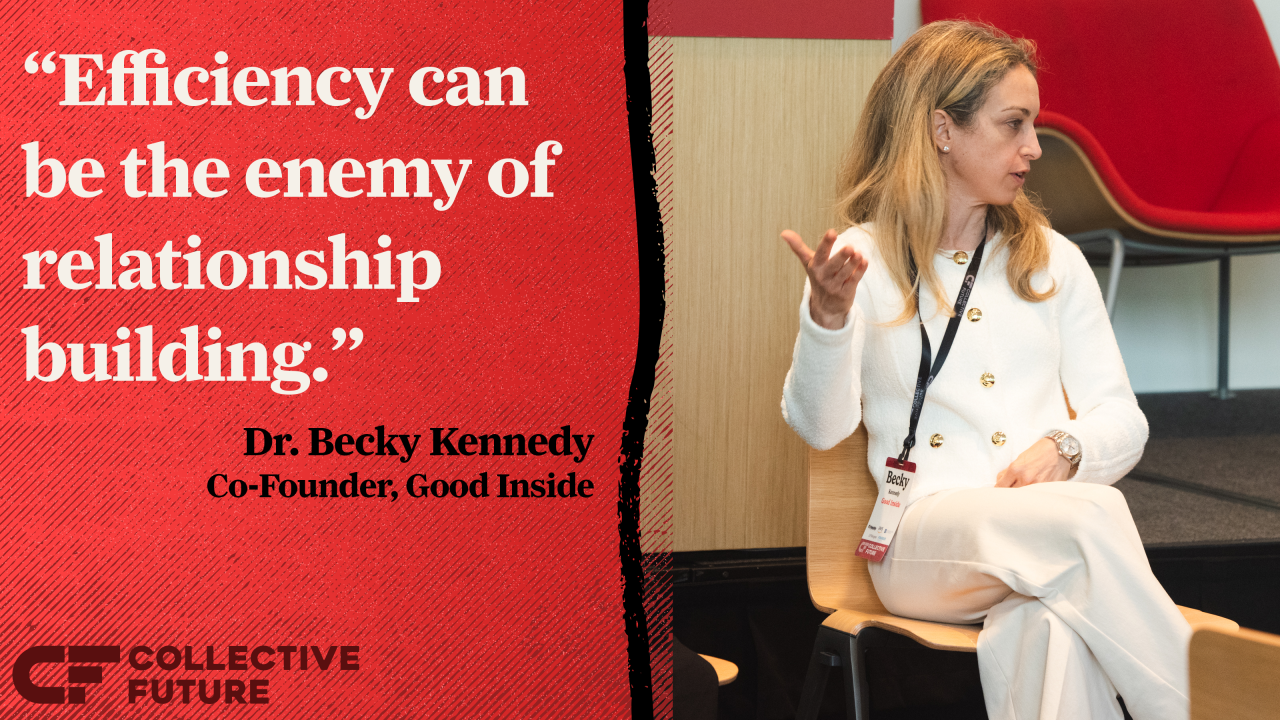What do you get out of most conference panels? One or two interesting insights? Someone new to follow on X?
At Collective Future, we aim higher. We don’t program “content.” We host conversations about everything from the latest and greatest in AI to perennial questions – how to manage three bedtimes, three thousand employees, and three-comma companies – without dropping the ball on any of them.
I was lucky enough to moderate a conversation with NYT bestselling author Dr. Becky Kennedy, famed founder-turned-funder Alexa Von Tobel, and a few dozen parents trying to manage this juggling act. Most of the conversation is off-the-record, but here are a few lessons to keep in mind as you attempt to balance the deal that must close today with the relationships that matter most.
Efficiency is the Enemy of Relationships
It can be hard for Type A personalities to appreciate, but your strongest bonds were probably formed inefficiently. Families thrive on lingering dinners and laugh-filled game nights. Business is no different. In a world of AI-optimized LinkedIn outreach, taking the time to schedule a real coffee can make all the difference.
Boundary-Setting That Actually Works
In order to make space for your most important relationships, you need to be militant about erecting boundaries on your time. Dr. Becky defined boundaries succinctly, “A boundary is something you tell someone else you will do, and it requires the other person to do nothing.”
This can be easier said than done, but Dr. Becky had a handful of great lines to use when people get persistent.
- Start messages with “I promised myself…” and watch how quickly people back off. “It takes a very special type of person to want you to break a promise to yourself,” she joked. Suddenly, saying no becomes about honoring your own integrity, not rejecting others.
- “I wanted to get back to you right away to let you know…” is a great way to start when you have to let someone down easy. Instead of being disappointed that you can’t join, people are primed to appreciate the quick reply – which is another way of showing you respect them and their time.
- Sometimes being ultra-specific can solve the problem. If someone is asking you for a favor, it’s totally fair to ask them to come back to you at a better time. The more specific you are, the more all over it you usually come across. Dr. Becky asks questions like, “Can you circle back the week of June 27?”

The Two-Door Phone Rule
Sometimes the solution isn’t a turn of phrase but increasing the number of knobs you need to turn. When trying to spend uninterrupted time with her kids, Dr. Becky shared a physical hack that everyone immediately wanted to steal: “My phone has to be behind two doors. One door is not enough. The bathroom, close the door; the bedroom, close the door.”
The “Emergency vs. Everything Else” Problem
Yext and Windmill Co-founder Brian Distelburger is the dad of three kids and an entrepreneur of two companies. He shared tactical advice he learned the hard way while scaling Yext: “If every day feels like an emergency, it’s always either a people problem or a systems problem.” The constant work-life creep? That’s not entrepreneurship – that’s broken operations. Sometimes the key to making time for your home life is auditing your work life.
The Questions That Changes Everything
Once a month, Dr. Becky asks her kids: “What is one thing I can do this week that makes me a better parent for you?” Then braces for the honest answer. The same question works at the office. “Just the asking of the question changes the relationship.”
Dr. Becky’s daily mantra that helps her drop into parent mode – which is often slower and less dopamine-rich than work mode? “Becky, this is the single most important thing you could be doing with your time right now.” Whether it’s Play-Doh or math homework, the purposeful language reorients an efficiency-obsessed brain into a connection-focused brain, which is what kids benefit the most from.

The Takeaway
The raw vulnerability of ultra-successful parents discussing the trade-offs between high-power careers and ever-shortening childhoods was nothing short of enlightening. There was a powerful, shared recognition that the pressure to “have it all” continues to weigh heavily on us all – even on the brilliant people who are quite literally building the future. Maybe most importantly, the conversation offered something rare: permission to stop pretending that balance is a destination instead of a daily recalibration.
If you missed Collective Future’s latest gathering, my hope is that this write-up, on how to juggle billion-dollar ambitions with bedtime stories, can capture even a fraction of these insights and help make founders’ impossible jobs just a tiny bit easier.
